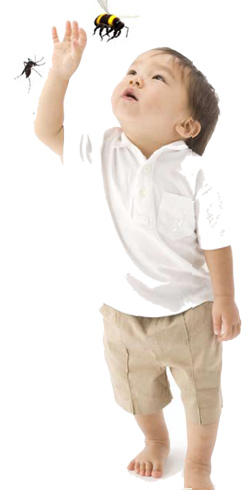The great outdoors, from parks and beaches, to your own garden, seems fraught with danger in the form of physical injuries or bites ranging from insects to large animals like dogs. Knowing what to do if it occurs will not only give you a peace of mind but also allow your child to continue exploring the world beyond his front porch.
Stings and bites are common in a tropical country like ours. Often, these are harmless, from ants, mosquitoes or sand flies. Some may cause more pain and discomfort, such as bee stings. However, some harmless bee sting may be fatal, as a result of an allergic reaction. Some bites from wasps, some spiders and snakes may be fatal or cause serious illness.
Has Your Child Been Stung?
The most common sign is crying from pain and discomfort. Other telltale signs include:
- Swelling over the affected area.
- Presence of stinger at the site.
- Allergic reaction to the sting, which in some cases, may progress to anaphylaxis.
Early signs of allergy include generalised itchiness, hives that may appear anywhere on the body, runny nose, sneezing and watery eyes. Anaphylaxis (allergic reactions) if left untreated may be fatal. Symptoms include difficulty in breathing, swelling of lips and eyes, feeling faint and loss of consciousness.
Treating Bee Stings
Some simple steps in which you could take to reduce your child’s discomfort if stung or bitten by an insect:
- Remove the stinger as fast as possible, and clean the area with soap and water.
- Apply ice over the affected site to numb the pain and reduce swelling. Oral paracetamol or ibuprofen will help reduce the pain while antihistamines will reduce the itch.
- Do see a doctor should there be any adverse reactions from the sting/bite.
RED Alert!
Wasp stings may cause renal failure. If your child has been bitten by a wasp, do monitor her urine output and colour.
Flea Bites
Fleabites are generally harmless. However, they do itch and may sometimes cause allergic reactions. Fleabites are not confined to families with pets. House dust mites belong to the flea family too, and are often found in beddings. The bites are noticed as red dots on body or limbs that may be extremely itchy and the affected area may be swollen. In most cases, applying antiitch or mild steroid cream will suffice. Taking oral antihistamines may help alleviate itchiness.
The best way to prevent fleabites is to get rid of the fleas. For house dust mites, bedding should be aired and exposed to sunlight. Children soft toys should be washed regularly with very hot water to kill the mites. Household pets such as cats and dogs should be bathed regularly to prevent flea infestations.
Bitten by a Dog?
Although Malaysia is free from rabies, dog bites can still result in severe injuries and infections, which may be fatal. Apart from blood loss, dog bites may result in local bacterial infections and tetanus (lockjaw).
Treatment of Dog Bites
- Clean the wound with water and antiseptic.
- Stop the bleeding by pressing over the wound.
- Seek immediate medical attention.
- Your child may require a tetanus shot if the last shot was more than 10 years ago.
- Most cases will require a course of antibiotics to treat secondary infection.
If your child encounters a stray dog, he should remain motionless instead of running and screaming as this would lead the dog to chase him. Children should also be more cautious – not disturbing or playing with dogs that are sleeping, eating, or caring for pups.
Sometimes, despite all the preventive measures, your child may still be a victim of insect or dog bites. If bitten, teach your child to report to you immediately. It is important that you stay calm, try to administer first aid and seek further medical attention.
Avoid Before They Bite!
- Use insect repellent to avoid mosquito bites. Do not allow your child to play near hives or anthills. Warn them repeatedly about throwing stones or objects at hives.
- Do not allow your child to play in deserted or abandoned buildings or areas. There may be snakes or other harmful predators.






Comments